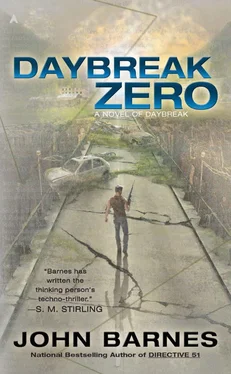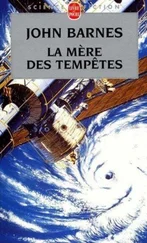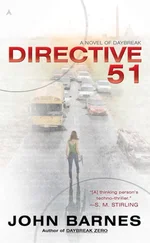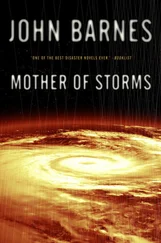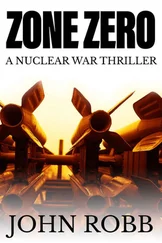Arnie looked straight into the terrified eyes of a boy holding a machete. He shot him in the face. All around, rifles and shotguns lashed out into the mob. Arnie fired again and again, reloading as fast as he could, as the Daybreakers fell back screaming and begging; when they turned to run, he shot at their backs until his last couple of shots were simply too far to get even the stragglers; by now the roar of fire had faded down to the last few bangs.
Quentin gently pressed down on his forearm. “Point your rifle at the ground, and take the round out of the chamber. The colonel needs to talk to all of us.”
THE NEXT DAY. CASTLE CASTRO (IN THE FORMER SAN DIEGO, CALIFORNIA). 11 AM PST. TUESDAY, JULY 15, 2025.
“I appreciate your coming to see me,” Harrison Castro said, as Pat O’Grainne rolled his wheelchair onto the balcony of the big office that overlooked San Diego Harbor. “If you’ll join me at the table, let’s have a drink and just enjoy the fact that it’s a fine day and no one is shooting at us.”
Two weeks after the Awakening Dolphin Children’s assault, the main keep of Castle Castro looked like what it was: a fortress under a collection of wreckage. The original design had concealed its nature as a system of concrete bunkers by putting stuccoed-plywood and z-brick frouf, fancy stained glass windows with steel veining, and ornate (but heavy) metal gratings in front of the bunker walls, all sunny hallways on the inside, all frivolity on the outside.
During the attacks of the last six months, all that faux decor had been smashed and burned. The charred, broken remains of it now clung in strands and heaps to the reinforced concrete walls between open spots where Castro’s own forces had pushed it aside to clear loopholes, observation slits, and sally ports.
“I’m sure glad you built this place,” Pat said, “and even gladder that old Heather had a connection to you, to get me in here. It doesn’t look like the old neighborhood stayed very nice.”
“Well, the people who came out of there sure weren’t.” Castro poured the sweet red wine that his Steward of the Barracks had assured him was Pat’s favorite. To judge by how fast it went into Pat, the steward had been on top of things. Well, no matter. The old guy took his turns at his loophole, and sober or not, he was a good shot, and how many real fighters aren’t hard drinkers anyway? “One more bit of business I ought to check with you while I have you here and before I forget. Those wheels we came up with for your chair—”
“Working fine. We were lucky to get a wheelwright in here, too.”
Actually luck had nothing to do with it. I put in years developing a big, big list of people with unusual skills I could shelter whenever it finally all fell down. I had so many people on such a diverse list that I was even ready for something as weird as Daybreak turned out to be. But it’s better for people to believe in luck; they don’t resent it the way they do foresight. “Sometimes luck is all that matters,” Castro said, sipping at the cheap, too-sweet wine and stretching expansively.
Pat was stretching, also, his eyes closed in bliss. “Mister Castro, I’m aware that you have three thousand people here at your Castle, and an old biker wouldn’t usually rate a private room in the inner keep. So… I kind of think you’re hoping to lobby my daughter in Pueblo.”
“Why don’t we talk business after lunch? I take it you’re not offended by my approaching your daughter through you?”
“No, I’m not. She might be. She was always ornery; I always thought she became a cop in the hopes of busting me someday. She might throw a hissy fit, but you know, Mister Castro, I’ve been dealing with Heather’s tantrums since she was two years old.”
After lunch, Harrison Castro refilled Pat O’Grainne’s glass. “Here’s the thing. For all its many failings, this has been a good country, hell, a great country, but what it finally died of was what most people thought made it great—it died of democracy. We just plain forget that the first colonies were founded by men who survived all sorts of hardship and danger to do it, and then rose to the top, so you had about four generations of really brutal natural selection, and then afterward all those natural leaders intermarried. So there was a real, genetic superiority about the Founding Fathers, and they wrote a constitution that would keep power where it belonged, in those superior families. And there have been other little pockets of superiority, produced by adversity and breeding, as well—the Louisiana Creoles, the Russian Jews, and if I may say so, the old Californios.
“The Constitution rests on the premise that the only meaningful freedom is the freedom of the alphas to—” Castro heard a sort of wet buzzing.
Pat O’Grainne was sound asleep, his leathery liver-spotted face tipped up to welcome the sun.
Harrison Castro shrugged, called in a servant, and instructed him to quietly return the old guy to his quarters. After O’Grainne was wheeled out, Castro stood a while on his balcony.
In the harbor, the half dozen boats coming out and going in all belonged to him; the second-biggest port on this side of the continent, now, and it’s all mine, if I can keep it .
IMMEDIATELY AFTERWARD. CASTLE CASTRO (IN THE FORMER SAN DIEGO, CALIFORNIA). 12:45 PM PST. TUESDAY, JULY 15, 2025.
Pat O’Grainne had always loved crossword puzzles, and always been able to hold his liquor; many nights when Heather was growing up he’d gotten a sixer-buzz on and done a crossword puzzle, flawlessly, in ink, just to show her he could. He sometimes thought that the intellectual stimulation of figuring out “ten-letter word, breathing toward Cleopatra’s death,” might have had something to do with how well Heather had done in school.
This wasn’t very different; first he wrote the letter to her, then he scrawled out his handmade crossword puzzle. 15 across (the day of the month) was “orogeny.” He used the definition and the text after it as a key to code the letter he had just written. Sometimes he surprised himself at how fast he could do this drunk; Heather said it was good because he never shortened or simplified messages to make the coding easier.
It pissed him off, though, seriously, that she said he should use the crappy grammar and spelling that he’d have used texting his biker buddies; she said it made the code harder to break, but he thought if some enemy ever did break the code, they’d think he was an idiot.
He returned to his coding:
…rilly has talk himself n2 this idea tht him n his buddies r tha natch leaders n shud run USA. he wants 2 chg tha constitution n b the fuckin Duke of California. I cud of herd mor but wz gettin 2 mad so faked a snore 2get 2go…
When he had finished, he recopied the code, wrote a mawkish note about how they didn’t pay enough attention to him and how Heather was ignoring him, copied the handmade crossword puzzle and the “secret code for you to work out, just like when you were a little girl” below that, and put the finished letter between books on his shelf; he’d give it to Carlucci or Bambi whenever they passed through. Then he put the original into the split log in his fireplace; it was a good thing this summer was so cold and he had an excuse for a fire almost every night.
THAT EVENING. PUEBLO, COLORADO. 10:15 PM MST. TUESDAY, JULY 15, 2025.
When Heather couldn’t sleep, she’d go upstairs, roll out her chart, and study it. Tonight she felt huge, lonely, and miserable, and bitter experience had taught her that once it reached the point where she couldn’t find a comfortable position, she was going to be up for at least another hour. So she padded upstairs, feeling like a grouchy she-bear, lit a lamp, pulled out the chart, and let her eyes just roam.
Читать дальше
